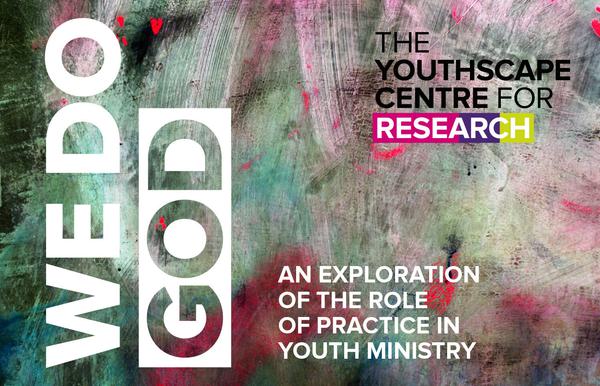Have we numbed ourselves to injustice? Gry Apeland explores the neglected spiritual practice of lament, and how it could serve youth work amidst global crisis.
I’ve been thinking about lament recently.
Earlier this year we published We do God, an exploration of Christian practice in youth ministry. We presented youth workers with a list of 21 spiritual practices and asked, “Which of these are you intentionally practising?”. Only 14% chose lament, leaving it at the bottom of the list, with only fasting coming out lower. The same youth workers were then asked which practices they had either taught young people about, or helped young people experience, and again lament placed as the second to last on the list. 34% had taught young people about lament, in contrast to 83% having taught young people about studying scripture. Further, only 20% had helped young people experience lament, reflecting our wider finding that we explain aspects of the Christian life more than we invite young people to directly experience them. We ran the survey in November 2019, when coronavirus was barely in the news. But lament feels more significant now. I wonder if our collective experience of a pandemic will help us learn more about how to include lament in our spiritual life?
A library of lament
Lament permeates the biblical narrative. The oldest book of the Bible is a poetic literary work where lament becomes personified in the main character, Job. About a third of the Psalms are psalms of lament. The book of Lamentations is centred on, wait for it…lament. This theme continues into the New Testament as well, where Jesus was well acquainted with the practice of lament. He lamented when his friend Lazarus had died, despite knowing that he was about to raise him from the dead. He lamented at the state of Jerusalem. He lamented as his own painful death was drawing near. Expressing grief was not foreign to Him. As he hung on the cross, he cried out to God, quoting a psalm of lament: “My God, my God, why have you forsaken me?” (Psalm 22).
In Scripture, lament appears to be a normal part of the reality of life with God, but my experience is that expressing grief and complaint before God is not something churches tend to engage in on a regular basis, if at all. I can’t claim to be good at practicing it myself. Let’s be honest, it is not glamorous or fun. But I still believe it’s important for lots of reasons, some of them theological, some psychological, and some social or political.
Telling the truth in a broken world
My background in psychology tells me that numbing pain is not a long-term solution. Through social media, we are often overwhelmed with stories of suffering and we have learned that to function in everyday life we can’t engage with every story of distress. So, many of us have become numb, in order to move on. But those of us with experience of therapy are well aware that reframing our suffering can reduce the emotional distress we feel in relation to it. By learning to look at it another way, we are able to learn to live with it, perhaps even accept it. What if we can employ the same meaning-making as a regular spiritual practice? Theologian Soong-Chan Rah writes in his book Prophetic Lament that “Biblical lament calls for honesty and truth-telling about the broken state of society and the individual.”
When we don’t have a space to express our grief about society or life, we can end up in a form of denial. It’s a natural survival mechanism, but when it becomes habitual it can leave us less prone to act on the injustices we witness. Most of us will know we must feel an injustice to be meaningfully moved into action. Allowing ourselves to feel the brokenness of our society, or even our own lives, might make us more able to empathise and be present with others in our lives.

Lament is also necessary if we are to have an honest relationship with God. As a Christian practice, lament is described as the expression of deep sorrow to God, while calling for Him to act on our behalf. Perhaps the most striking feature of lamentations found throughout scripture is that they tend to end in praise. It is a journey through which writers bring their honest emotions in front of their Creator, allow themselves to rage, to be disappointed, to suffer, and finally to make some kind of meaning of that suffering in light of a relationship with God. The presence of lament throughout the Bible tells us that we can safely express our honest feelings to God, and it can even lead us into deeper relationship. King David – the credited writer of many of the psalms of lament – was described as a man after God’s heart. Did his capacity for honest lamenting in God’s presence lead to that? Or perhaps, a deeper relationship with God led to more lamenting in His presence?
In the collective trauma of a global pandemic, it is imperative that we lament. Grief, in its nature, demands to be felt – it will not be ignored in the long term. Even if we ourselves have not lost loved ones, it is likely we will encounter others, whether the young people we work with or others, who have. Lament then, becomes a space in which we allow ourselves to empathise on a deeper level with our young people. In which we say, ‘Your pain is valid and we will sit with you in it’. It becomes a healing space.
Feeling pain, facing injustice
And despite decades or even centuries of lamenting and fighting for change, some of us are only now waking up to the painful reality of what many black and brown people have experienced at the hands of white supremacy – a system I for one have personally benefited from. This calls for repentance, and it calls for lament. As the church – as the white church – we must be willing to experience the discomfort of acknowledging what people of colour have experienced and the pain that we might have been part of creating. And we must allow ourselves to really feel their pain so that we too would be meaningfully moved into action.
One of the key findings of the We Do God report was that practice has to be modelled, not just talked about. If we are to hold space for lament with young people, we are invited to experience and practice this ourselves first. If lament really is one the least-practised aspects of our faith, then we have a journey to go on, to both understand its value and learn to practice it ourselves. Soong-Chan Rah writes “Lament helps the people of God find hope even in the midst of suffering”, and I can’t think of a better time to look for some hope than in the midst of our current suffering. Both for ourselves, and then for the young people we encounter.
If you have registered for the Now What conference today, your free resource has some exercises that help begin to practice lament in the context of youth work and COVID-19. To learn more about lament, please take a look at the links below.
Suffering in God's Presence: The Role of Lament in Transformation - Elizabeth Lewis Hall
Learning to Lament | Exploring Prayer with Archbishop Justin Welby
Art & Theology | Revitalizing the Christian imagination through painting, poetry, music, and more








